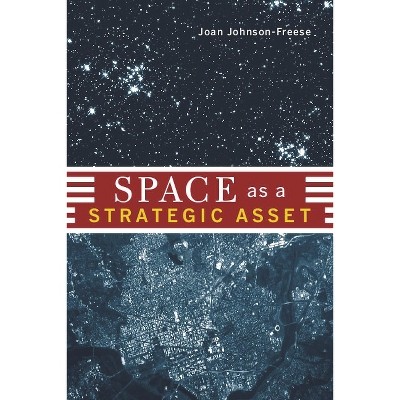Heavenly Ambitions - by Joan Johnson-Freese (Paperback)

About this item
Highlights
- In the popular imagination, space is the final frontier.
- About the Author: Joan Johnson-Freese is Professor in the Department of National Security Affairs at the Naval War College and author of Space as a Strategic Asset.
- 192 Pages
- Political Science, Security (National & International)
Description
About the Book
In Heavenly Ambitions, Joan Johnson-Freese lays out her vision of the future of space as a frontier where nations cooperate, and military activity is circumscribed by arms control treaties that would allow no one nation to dominate--just as no one nation's military dominates the world's oceans.Book Synopsis
In the popular imagination, space is the final frontier. Will that frontier be a wild west, or will it instead be treated as the oceans are: as a global commons, where commerce is allowed to flourish and no one country dominates? At this moment, nations are free to send missions to Mars or launch space stations. Space satellites are vital to many of the activities that have become part of our daily lives--from weather forecasting to GPS and satellite radio. The militaries of the United States and a host of other nations have also made space a critical arena--spy and communication satellites are essential to their operations. Beginning with the Reagan administration and its attempt to create a missile defense system to protect against attack by the Soviet Union, the U.S. military has decided that the United States should be the dominant power in space in order to protect civilian and defense assets. In Heavenly Ambitions, Joan Johnson-Freese draws from a myriad of sources to argue that the United States is on the wrong path: first, by politicizing the question of space threats and, second, by continuing to believe that military domination in space is the only way to protect U.S. interests in space.
Johnson-Freese, who has written and lectured extensively on space policy, lays out her vision of the future of space as a frontier where nations cooperate and military activity is circumscribed by arms control treaties that would allow no one nation to dominate--just as no one nation's military dominates the world's oceans. This is in the world's interest and, most important, in the U.S. national interest.
Review Quotes
"Heavenly Ambitions should be read by everyone who makes policy, or who thinks seriously about policy. By highlighting dangers such as confusing desirability with feasibility and ignoring the increasingly global nature of space, Johnson-Freese points out key pitfalls of the current U.S. approach to space policy, and suggests a more productive way forward."-- "David Wright, Union of Concerned Scientists"
"[Heavenly Ambitions] provides an understanding of the almost indecipherable national security space bureaucracy and all its stakeholders, [and] is the first work to measure these triumphant images against the realities of technology and politics."-- "Quest"
"[Johnson-Freese] rightly discusses at length the emerging U.S.-China space relationship. . . . One of the most convincing parts of the book is devoted to the risks of miscommunication between Washington and Beijing on their respective strategic intentions in space."-- "Survival: Global Politics and Strategy"
"A detailed, well-written, and accessible book."-- "Geopolitics"
"A thoroughly researched and praiseworthy book."-- "Astronomy Now"
"Joan Johnson-Freese clearly identifies the present state of America's space program, the critical issues and challenges the United States faces, the urgent need for action, and the course the United States should follow in its future endeavors in space. Heavenly Ambitions is a book that should be read and heeded by all those involved in the making of this nation's policies in space."-- "George Abbey, former director, NASA Johnson Space Center"
About the Author
Joan Johnson-Freese is Professor in the Department of National Security Affairs at the Naval War College and author of Space as a Strategic Asset.










